Communication Skills Report - Effective Communication in the Workplace
VerifiedAdded on 2023/01/06
|10
|2887
|81
Report
AI Summary
This report delves into the crucial aspects of effective communication skills within a professional setting. It begins with an introduction to the fundamental principles of communication, emphasizing its role in conveying information clearly and concisely. The main body of the report explores the significance of effective communication in fostering a positive work environment, improving employee productivity, and mitigating conflicts. It provides insights into the communication process, including the roles of sender and receiver, the importance of feedback, and the barriers that can impede effective communication. Furthermore, the report examines the impact of communication skills on workplace behavior, highlighting their role in developing leadership qualities, building trust, and empowering team members. The report also discusses negotiation and influencing skills as essential components of interpersonal communication, outlining principles for successful negotiation, such as focusing on needs rather than positions, creating win-win options, and making clear agreements. The report concludes with a reflective summary and a list of references.
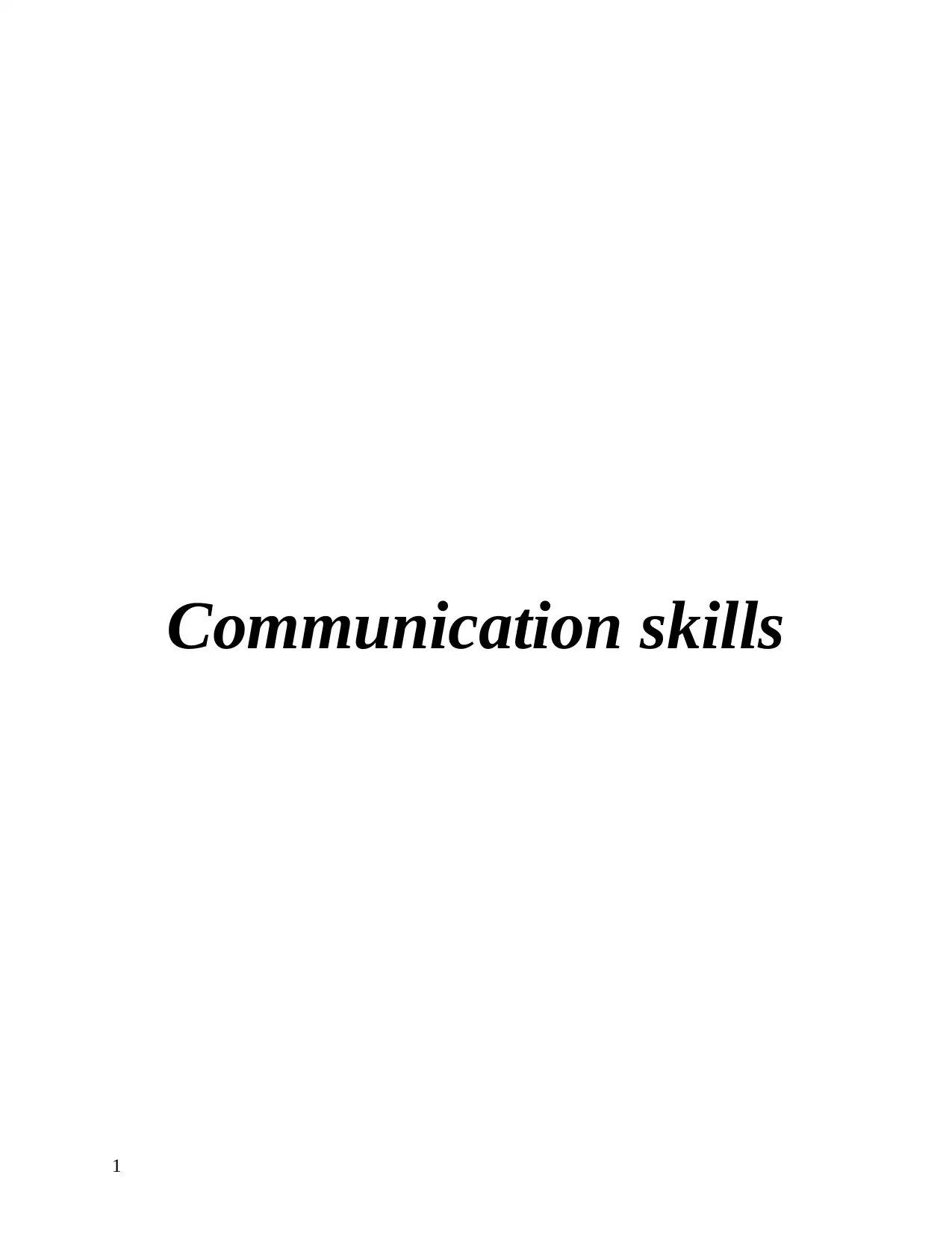
Communication skills
1
1
Paraphrase This Document
Need a fresh take? Get an instant paraphrase of this document with our AI Paraphraser
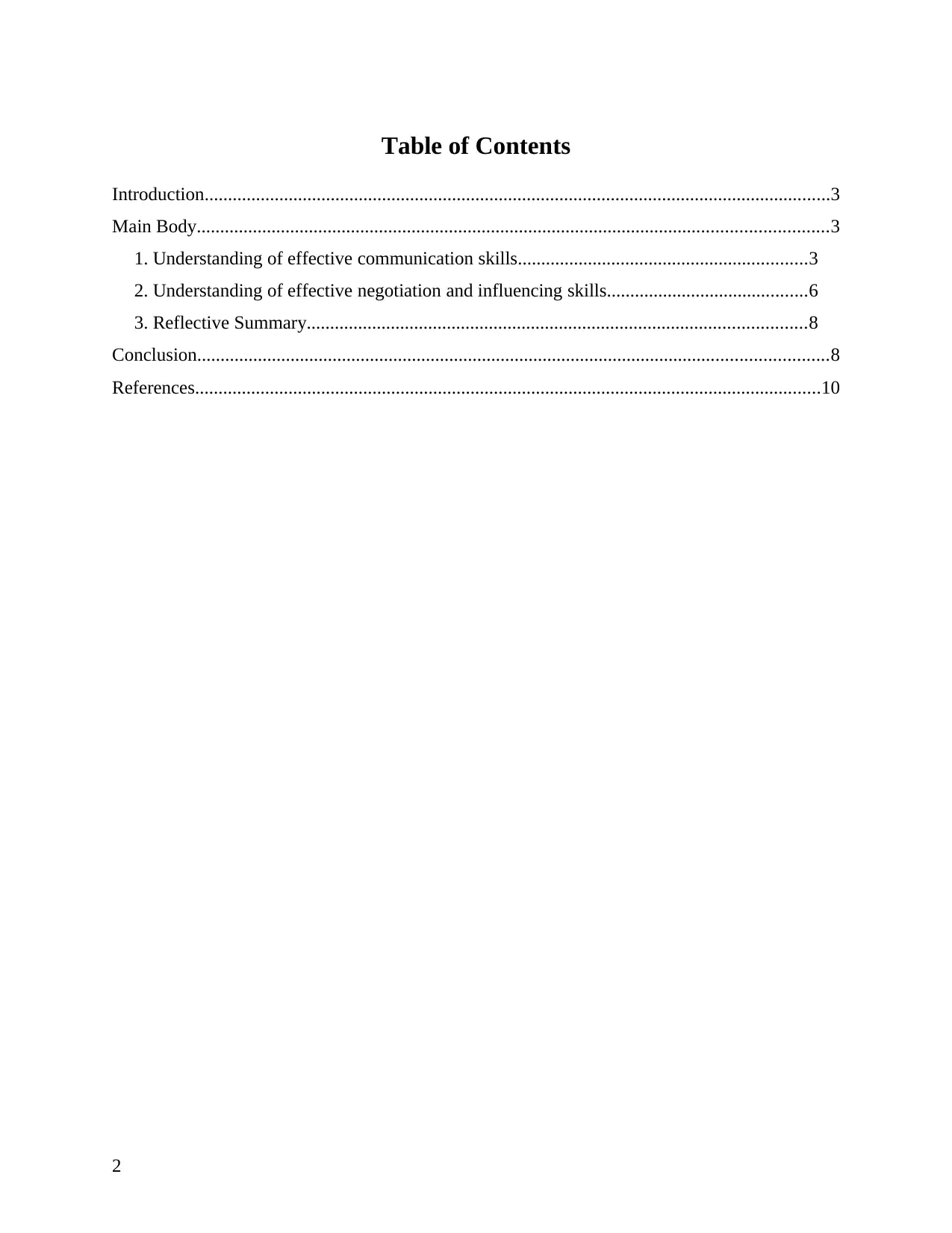
Table of Contents
Introduction......................................................................................................................................3
Main Body.......................................................................................................................................3
1. Understanding of effective communication skills..............................................................3
2. Understanding of effective negotiation and influencing skills...........................................6
3. Reflective Summary...........................................................................................................8
Conclusion.......................................................................................................................................8
References......................................................................................................................................10
2
Introduction......................................................................................................................................3
Main Body.......................................................................................................................................3
1. Understanding of effective communication skills..............................................................3
2. Understanding of effective negotiation and influencing skills...........................................6
3. Reflective Summary...........................................................................................................8
Conclusion.......................................................................................................................................8
References......................................................................................................................................10
2
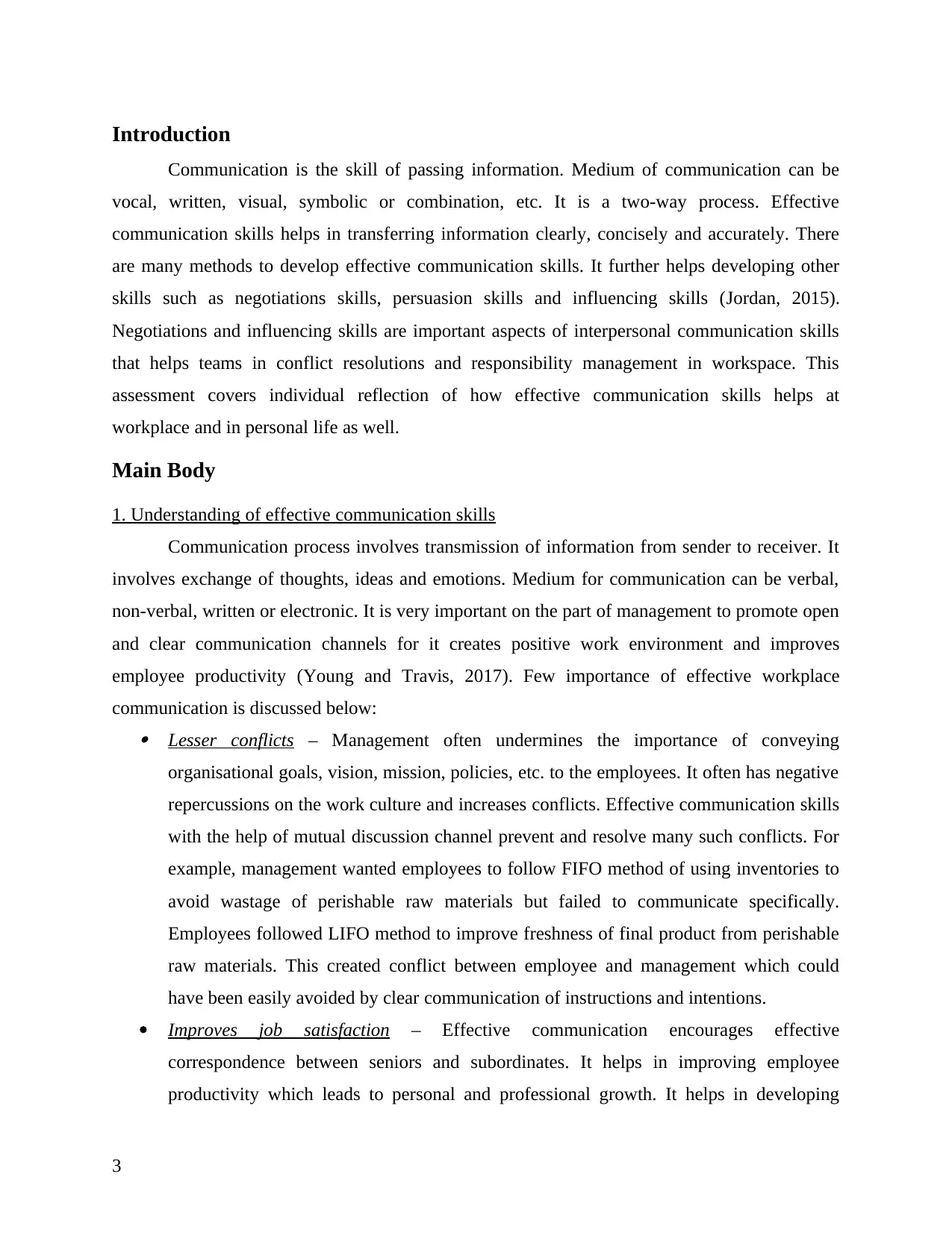
Introduction
Communication is the skill of passing information. Medium of communication can be
vocal, written, visual, symbolic or combination, etc. It is a two-way process. Effective
communication skills helps in transferring information clearly, concisely and accurately. There
are many methods to develop effective communication skills. It further helps developing other
skills such as negotiations skills, persuasion skills and influencing skills (Jordan, 2015).
Negotiations and influencing skills are important aspects of interpersonal communication skills
that helps teams in conflict resolutions and responsibility management in workspace. This
assessment covers individual reflection of how effective communication skills helps at
workplace and in personal life as well.
Main Body
1. Understanding of effective communication skills
Communication process involves transmission of information from sender to receiver. It
involves exchange of thoughts, ideas and emotions. Medium for communication can be verbal,
non-verbal, written or electronic. It is very important on the part of management to promote open
and clear communication channels for it creates positive work environment and improves
employee productivity (Young and Travis, 2017). Few importance of effective workplace
communication is discussed below: Lesser conflicts – Management often undermines the importance of conveying
organisational goals, vision, mission, policies, etc. to the employees. It often has negative
repercussions on the work culture and increases conflicts. Effective communication skills
with the help of mutual discussion channel prevent and resolve many such conflicts. For
example, management wanted employees to follow FIFO method of using inventories to
avoid wastage of perishable raw materials but failed to communicate specifically.
Employees followed LIFO method to improve freshness of final product from perishable
raw materials. This created conflict between employee and management which could
have been easily avoided by clear communication of instructions and intentions.
Improves job satisfaction – Effective communication encourages effective
correspondence between seniors and subordinates. It helps in improving employee
productivity which leads to personal and professional growth. It helps in developing
3
Communication is the skill of passing information. Medium of communication can be
vocal, written, visual, symbolic or combination, etc. It is a two-way process. Effective
communication skills helps in transferring information clearly, concisely and accurately. There
are many methods to develop effective communication skills. It further helps developing other
skills such as negotiations skills, persuasion skills and influencing skills (Jordan, 2015).
Negotiations and influencing skills are important aspects of interpersonal communication skills
that helps teams in conflict resolutions and responsibility management in workspace. This
assessment covers individual reflection of how effective communication skills helps at
workplace and in personal life as well.
Main Body
1. Understanding of effective communication skills
Communication process involves transmission of information from sender to receiver. It
involves exchange of thoughts, ideas and emotions. Medium for communication can be verbal,
non-verbal, written or electronic. It is very important on the part of management to promote open
and clear communication channels for it creates positive work environment and improves
employee productivity (Young and Travis, 2017). Few importance of effective workplace
communication is discussed below: Lesser conflicts – Management often undermines the importance of conveying
organisational goals, vision, mission, policies, etc. to the employees. It often has negative
repercussions on the work culture and increases conflicts. Effective communication skills
with the help of mutual discussion channel prevent and resolve many such conflicts. For
example, management wanted employees to follow FIFO method of using inventories to
avoid wastage of perishable raw materials but failed to communicate specifically.
Employees followed LIFO method to improve freshness of final product from perishable
raw materials. This created conflict between employee and management which could
have been easily avoided by clear communication of instructions and intentions.
Improves job satisfaction – Effective communication encourages effective
correspondence between seniors and subordinates. It helps in improving employee
productivity which leads to personal and professional growth. It helps in developing
3
⊘ This is a preview!⊘
Do you want full access?
Subscribe today to unlock all pages.

Trusted by 1+ million students worldwide
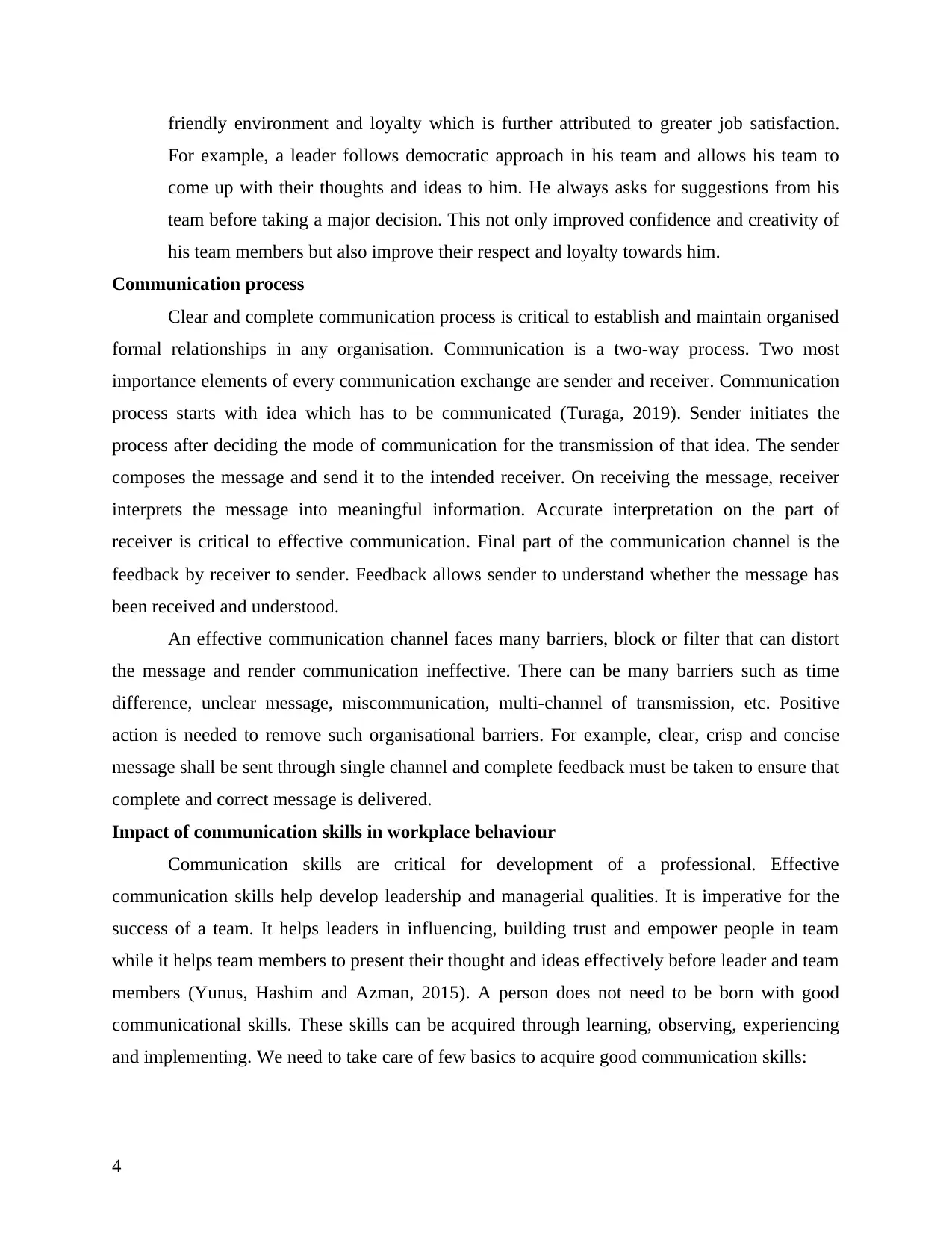
friendly environment and loyalty which is further attributed to greater job satisfaction.
For example, a leader follows democratic approach in his team and allows his team to
come up with their thoughts and ideas to him. He always asks for suggestions from his
team before taking a major decision. This not only improved confidence and creativity of
his team members but also improve their respect and loyalty towards him.
Communication process
Clear and complete communication process is critical to establish and maintain organised
formal relationships in any organisation. Communication is a two-way process. Two most
importance elements of every communication exchange are sender and receiver. Communication
process starts with idea which has to be communicated (Turaga, 2019). Sender initiates the
process after deciding the mode of communication for the transmission of that idea. The sender
composes the message and send it to the intended receiver. On receiving the message, receiver
interprets the message into meaningful information. Accurate interpretation on the part of
receiver is critical to effective communication. Final part of the communication channel is the
feedback by receiver to sender. Feedback allows sender to understand whether the message has
been received and understood.
An effective communication channel faces many barriers, block or filter that can distort
the message and render communication ineffective. There can be many barriers such as time
difference, unclear message, miscommunication, multi-channel of transmission, etc. Positive
action is needed to remove such organisational barriers. For example, clear, crisp and concise
message shall be sent through single channel and complete feedback must be taken to ensure that
complete and correct message is delivered.
Impact of communication skills in workplace behaviour
Communication skills are critical for development of a professional. Effective
communication skills help develop leadership and managerial qualities. It is imperative for the
success of a team. It helps leaders in influencing, building trust and empower people in team
while it helps team members to present their thought and ideas effectively before leader and team
members (Yunus, Hashim and Azman, 2015). A person does not need to be born with good
communicational skills. These skills can be acquired through learning, observing, experiencing
and implementing. We need to take care of few basics to acquire good communication skills:
4
For example, a leader follows democratic approach in his team and allows his team to
come up with their thoughts and ideas to him. He always asks for suggestions from his
team before taking a major decision. This not only improved confidence and creativity of
his team members but also improve their respect and loyalty towards him.
Communication process
Clear and complete communication process is critical to establish and maintain organised
formal relationships in any organisation. Communication is a two-way process. Two most
importance elements of every communication exchange are sender and receiver. Communication
process starts with idea which has to be communicated (Turaga, 2019). Sender initiates the
process after deciding the mode of communication for the transmission of that idea. The sender
composes the message and send it to the intended receiver. On receiving the message, receiver
interprets the message into meaningful information. Accurate interpretation on the part of
receiver is critical to effective communication. Final part of the communication channel is the
feedback by receiver to sender. Feedback allows sender to understand whether the message has
been received and understood.
An effective communication channel faces many barriers, block or filter that can distort
the message and render communication ineffective. There can be many barriers such as time
difference, unclear message, miscommunication, multi-channel of transmission, etc. Positive
action is needed to remove such organisational barriers. For example, clear, crisp and concise
message shall be sent through single channel and complete feedback must be taken to ensure that
complete and correct message is delivered.
Impact of communication skills in workplace behaviour
Communication skills are critical for development of a professional. Effective
communication skills help develop leadership and managerial qualities. It is imperative for the
success of a team. It helps leaders in influencing, building trust and empower people in team
while it helps team members to present their thought and ideas effectively before leader and team
members (Yunus, Hashim and Azman, 2015). A person does not need to be born with good
communicational skills. These skills can be acquired through learning, observing, experiencing
and implementing. We need to take care of few basics to acquire good communication skills:
4
Paraphrase This Document
Need a fresh take? Get an instant paraphrase of this document with our AI Paraphraser
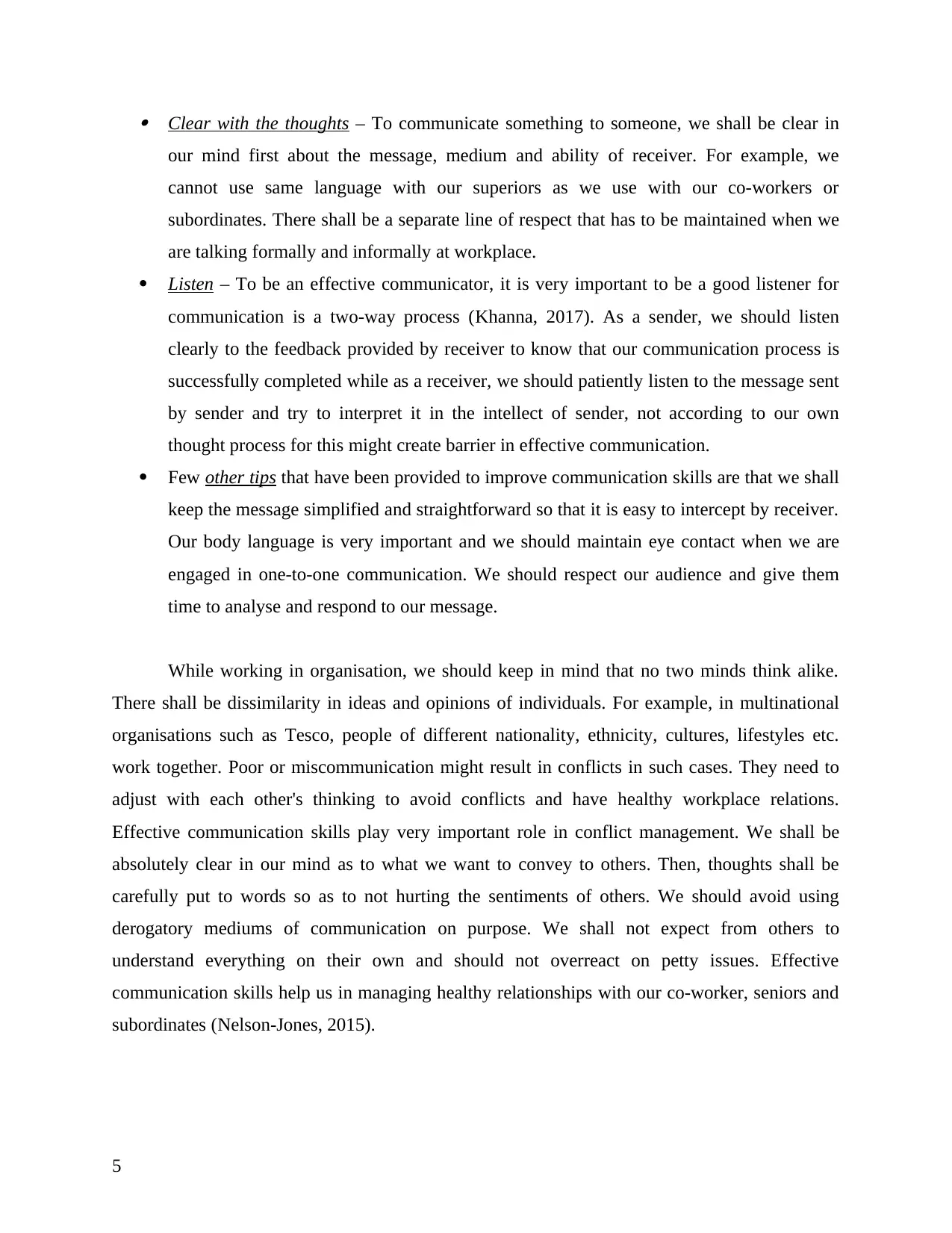
Clear with the thoughts – To communicate something to someone, we shall be clear in
our mind first about the message, medium and ability of receiver. For example, we
cannot use same language with our superiors as we use with our co-workers or
subordinates. There shall be a separate line of respect that has to be maintained when we
are talking formally and informally at workplace.
Listen – To be an effective communicator, it is very important to be a good listener for
communication is a two-way process (Khanna, 2017). As a sender, we should listen
clearly to the feedback provided by receiver to know that our communication process is
successfully completed while as a receiver, we should patiently listen to the message sent
by sender and try to interpret it in the intellect of sender, not according to our own
thought process for this might create barrier in effective communication.
Few other tips that have been provided to improve communication skills are that we shall
keep the message simplified and straightforward so that it is easy to intercept by receiver.
Our body language is very important and we should maintain eye contact when we are
engaged in one-to-one communication. We should respect our audience and give them
time to analyse and respond to our message.
While working in organisation, we should keep in mind that no two minds think alike.
There shall be dissimilarity in ideas and opinions of individuals. For example, in multinational
organisations such as Tesco, people of different nationality, ethnicity, cultures, lifestyles etc.
work together. Poor or miscommunication might result in conflicts in such cases. They need to
adjust with each other's thinking to avoid conflicts and have healthy workplace relations.
Effective communication skills play very important role in conflict management. We shall be
absolutely clear in our mind as to what we want to convey to others. Then, thoughts shall be
carefully put to words so as to not hurting the sentiments of others. We should avoid using
derogatory mediums of communication on purpose. We shall not expect from others to
understand everything on their own and should not overreact on petty issues. Effective
communication skills help us in managing healthy relationships with our co-worker, seniors and
subordinates (Nelson-Jones, 2015).
5
our mind first about the message, medium and ability of receiver. For example, we
cannot use same language with our superiors as we use with our co-workers or
subordinates. There shall be a separate line of respect that has to be maintained when we
are talking formally and informally at workplace.
Listen – To be an effective communicator, it is very important to be a good listener for
communication is a two-way process (Khanna, 2017). As a sender, we should listen
clearly to the feedback provided by receiver to know that our communication process is
successfully completed while as a receiver, we should patiently listen to the message sent
by sender and try to interpret it in the intellect of sender, not according to our own
thought process for this might create barrier in effective communication.
Few other tips that have been provided to improve communication skills are that we shall
keep the message simplified and straightforward so that it is easy to intercept by receiver.
Our body language is very important and we should maintain eye contact when we are
engaged in one-to-one communication. We should respect our audience and give them
time to analyse and respond to our message.
While working in organisation, we should keep in mind that no two minds think alike.
There shall be dissimilarity in ideas and opinions of individuals. For example, in multinational
organisations such as Tesco, people of different nationality, ethnicity, cultures, lifestyles etc.
work together. Poor or miscommunication might result in conflicts in such cases. They need to
adjust with each other's thinking to avoid conflicts and have healthy workplace relations.
Effective communication skills play very important role in conflict management. We shall be
absolutely clear in our mind as to what we want to convey to others. Then, thoughts shall be
carefully put to words so as to not hurting the sentiments of others. We should avoid using
derogatory mediums of communication on purpose. We shall not expect from others to
understand everything on their own and should not overreact on petty issues. Effective
communication skills help us in managing healthy relationships with our co-worker, seniors and
subordinates (Nelson-Jones, 2015).
5
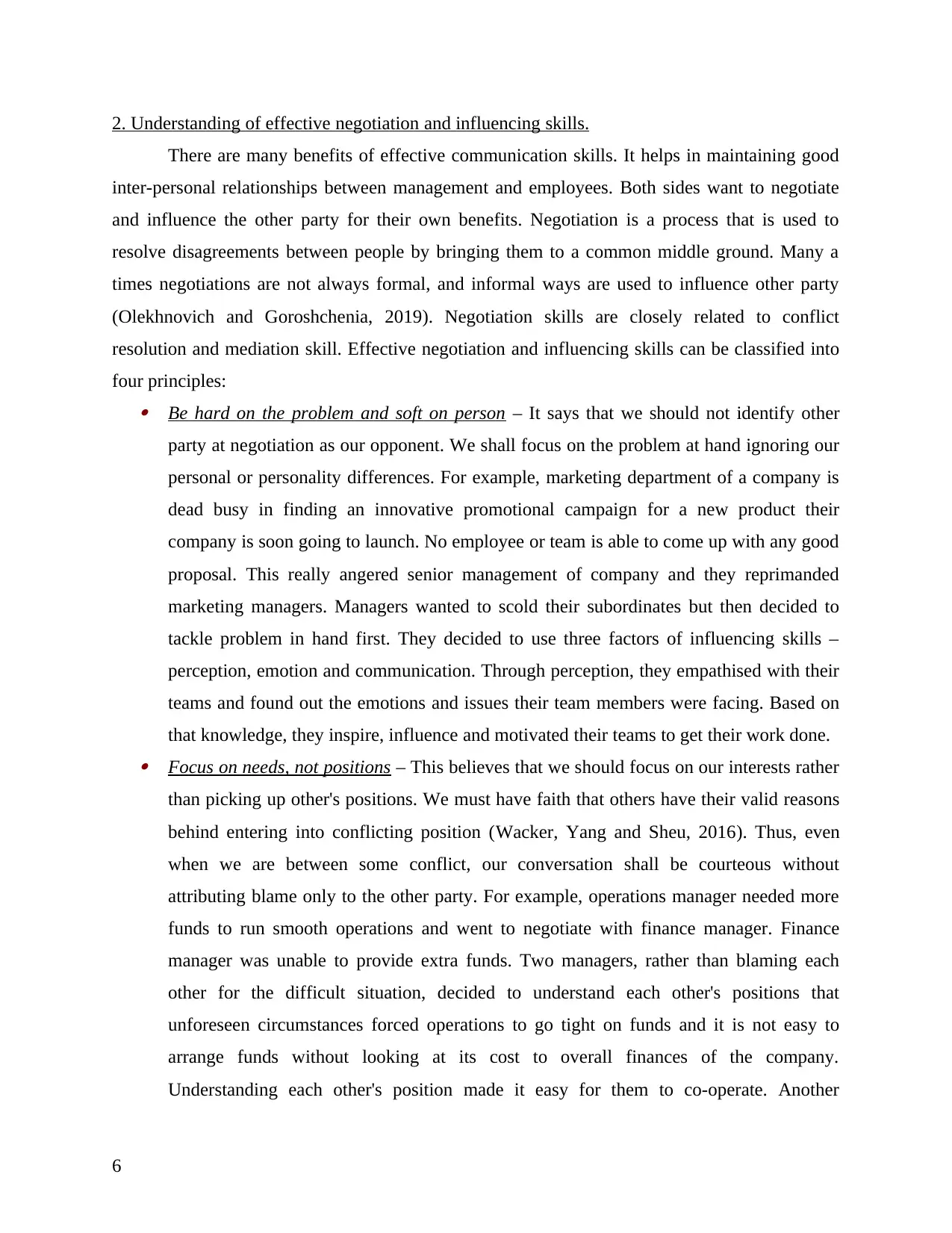
2. Understanding of effective negotiation and influencing skills.
There are many benefits of effective communication skills. It helps in maintaining good
inter-personal relationships between management and employees. Both sides want to negotiate
and influence the other party for their own benefits. Negotiation is a process that is used to
resolve disagreements between people by bringing them to a common middle ground. Many a
times negotiations are not always formal, and informal ways are used to influence other party
(Olekhnovich and Goroshchenia, 2019). Negotiation skills are closely related to conflict
resolution and mediation skill. Effective negotiation and influencing skills can be classified into
four principles: Be hard on the problem and soft on person – It says that we should not identify other
party at negotiation as our opponent. We shall focus on the problem at hand ignoring our
personal or personality differences. For example, marketing department of a company is
dead busy in finding an innovative promotional campaign for a new product their
company is soon going to launch. No employee or team is able to come up with any good
proposal. This really angered senior management of company and they reprimanded
marketing managers. Managers wanted to scold their subordinates but then decided to
tackle problem in hand first. They decided to use three factors of influencing skills –
perception, emotion and communication. Through perception, they empathised with their
teams and found out the emotions and issues their team members were facing. Based on
that knowledge, they inspire, influence and motivated their teams to get their work done. Focus on needs, not positions – This believes that we should focus on our interests rather
than picking up other's positions. We must have faith that others have their valid reasons
behind entering into conflicting position (Wacker, Yang and Sheu, 2016). Thus, even
when we are between some conflict, our conversation shall be courteous without
attributing blame only to the other party. For example, operations manager needed more
funds to run smooth operations and went to negotiate with finance manager. Finance
manager was unable to provide extra funds. Two managers, rather than blaming each
other for the difficult situation, decided to understand each other's positions that
unforeseen circumstances forced operations to go tight on funds and it is not easy to
arrange funds without looking at its cost to overall finances of the company.
Understanding each other's position made it easy for them to co-operate. Another
6
There are many benefits of effective communication skills. It helps in maintaining good
inter-personal relationships between management and employees. Both sides want to negotiate
and influence the other party for their own benefits. Negotiation is a process that is used to
resolve disagreements between people by bringing them to a common middle ground. Many a
times negotiations are not always formal, and informal ways are used to influence other party
(Olekhnovich and Goroshchenia, 2019). Negotiation skills are closely related to conflict
resolution and mediation skill. Effective negotiation and influencing skills can be classified into
four principles: Be hard on the problem and soft on person – It says that we should not identify other
party at negotiation as our opponent. We shall focus on the problem at hand ignoring our
personal or personality differences. For example, marketing department of a company is
dead busy in finding an innovative promotional campaign for a new product their
company is soon going to launch. No employee or team is able to come up with any good
proposal. This really angered senior management of company and they reprimanded
marketing managers. Managers wanted to scold their subordinates but then decided to
tackle problem in hand first. They decided to use three factors of influencing skills –
perception, emotion and communication. Through perception, they empathised with their
teams and found out the emotions and issues their team members were facing. Based on
that knowledge, they inspire, influence and motivated their teams to get their work done. Focus on needs, not positions – This believes that we should focus on our interests rather
than picking up other's positions. We must have faith that others have their valid reasons
behind entering into conflicting position (Wacker, Yang and Sheu, 2016). Thus, even
when we are between some conflict, our conversation shall be courteous without
attributing blame only to the other party. For example, operations manager needed more
funds to run smooth operations and went to negotiate with finance manager. Finance
manager was unable to provide extra funds. Two managers, rather than blaming each
other for the difficult situation, decided to understand each other's positions that
unforeseen circumstances forced operations to go tight on funds and it is not easy to
arrange funds without looking at its cost to overall finances of the company.
Understanding each other's position made it easy for them to co-operate. Another
6
⊘ This is a preview!⊘
Do you want full access?
Subscribe today to unlock all pages.

Trusted by 1+ million students worldwide
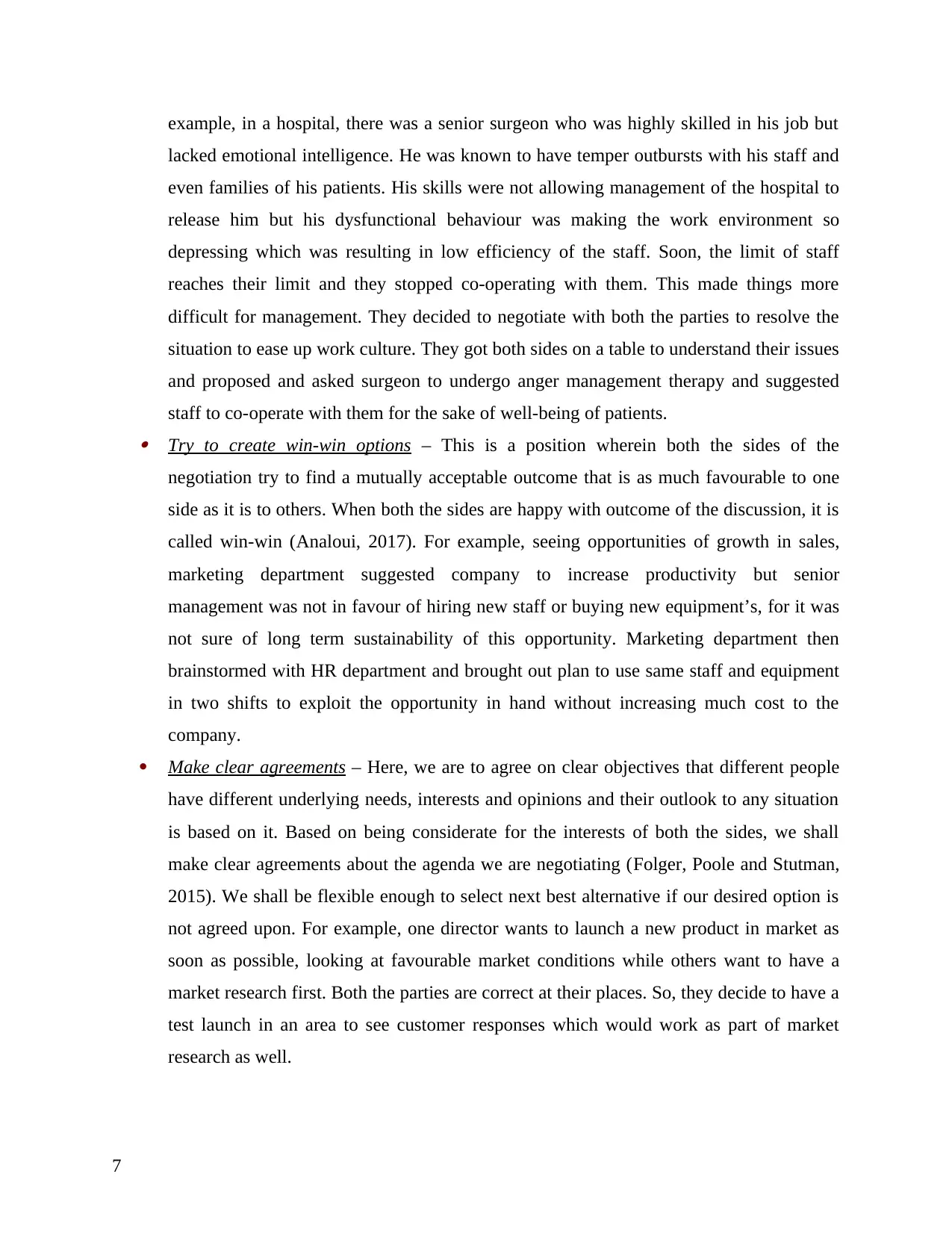
example, in a hospital, there was a senior surgeon who was highly skilled in his job but
lacked emotional intelligence. He was known to have temper outbursts with his staff and
even families of his patients. His skills were not allowing management of the hospital to
release him but his dysfunctional behaviour was making the work environment so
depressing which was resulting in low efficiency of the staff. Soon, the limit of staff
reaches their limit and they stopped co-operating with them. This made things more
difficult for management. They decided to negotiate with both the parties to resolve the
situation to ease up work culture. They got both sides on a table to understand their issues
and proposed and asked surgeon to undergo anger management therapy and suggested
staff to co-operate with them for the sake of well-being of patients. Try to create win-win options – This is a position wherein both the sides of the
negotiation try to find a mutually acceptable outcome that is as much favourable to one
side as it is to others. When both the sides are happy with outcome of the discussion, it is
called win-win (Analoui, 2017). For example, seeing opportunities of growth in sales,
marketing department suggested company to increase productivity but senior
management was not in favour of hiring new staff or buying new equipment’s, for it was
not sure of long term sustainability of this opportunity. Marketing department then
brainstormed with HR department and brought out plan to use same staff and equipment
in two shifts to exploit the opportunity in hand without increasing much cost to the
company.
Make clear agreements – Here, we are to agree on clear objectives that different people
have different underlying needs, interests and opinions and their outlook to any situation
is based on it. Based on being considerate for the interests of both the sides, we shall
make clear agreements about the agenda we are negotiating (Folger, Poole and Stutman,
2015). We shall be flexible enough to select next best alternative if our desired option is
not agreed upon. For example, one director wants to launch a new product in market as
soon as possible, looking at favourable market conditions while others want to have a
market research first. Both the parties are correct at their places. So, they decide to have a
test launch in an area to see customer responses which would work as part of market
research as well.
7
lacked emotional intelligence. He was known to have temper outbursts with his staff and
even families of his patients. His skills were not allowing management of the hospital to
release him but his dysfunctional behaviour was making the work environment so
depressing which was resulting in low efficiency of the staff. Soon, the limit of staff
reaches their limit and they stopped co-operating with them. This made things more
difficult for management. They decided to negotiate with both the parties to resolve the
situation to ease up work culture. They got both sides on a table to understand their issues
and proposed and asked surgeon to undergo anger management therapy and suggested
staff to co-operate with them for the sake of well-being of patients. Try to create win-win options – This is a position wherein both the sides of the
negotiation try to find a mutually acceptable outcome that is as much favourable to one
side as it is to others. When both the sides are happy with outcome of the discussion, it is
called win-win (Analoui, 2017). For example, seeing opportunities of growth in sales,
marketing department suggested company to increase productivity but senior
management was not in favour of hiring new staff or buying new equipment’s, for it was
not sure of long term sustainability of this opportunity. Marketing department then
brainstormed with HR department and brought out plan to use same staff and equipment
in two shifts to exploit the opportunity in hand without increasing much cost to the
company.
Make clear agreements – Here, we are to agree on clear objectives that different people
have different underlying needs, interests and opinions and their outlook to any situation
is based on it. Based on being considerate for the interests of both the sides, we shall
make clear agreements about the agenda we are negotiating (Folger, Poole and Stutman,
2015). We shall be flexible enough to select next best alternative if our desired option is
not agreed upon. For example, one director wants to launch a new product in market as
soon as possible, looking at favourable market conditions while others want to have a
market research first. Both the parties are correct at their places. So, they decide to have a
test launch in an area to see customer responses which would work as part of market
research as well.
7
Paraphrase This Document
Need a fresh take? Get an instant paraphrase of this document with our AI Paraphraser

For example, there is a situation where company is facing losses. Management wants to
lay of some employees while employees are not ready to part with their jobs. Both sides are
ready to negotiate but want to influence and persuade other side to their advantage. So there was
no resolution of the conflict and the negotiations stand failed. Then, official representatives were
appointed for both sides to negotiate. They met to decide common agenda and few rules. First
thing they agree was to enter into a transactional analysis i.e. to create a win-win situation for
both sides. Rules were decided such as no side would misunderstand other side's intentions, no
side would try to arrange pressure from social organisations outside the organisation, no party
would force on ex-party solution, etc. With clear instructions alongside effective negotiations
and persuasions, they were able to strike a balance and draw out solutions that both side agreed.
It was agreed that management would not lay off by force but will provide employees an
opportunity to take superannuation and those who are willing can exercise the option. Employees
on the other hand, agreed to take a pay cut until the time company does recover its losses.
Conclusion
Effective communication skills are critical to both professional and personal development
of an individual. Effective communication skills in a healthcare centre improves management's
ability to administer the relationship between staff and the patients in a more refined way with
helping patients to feel at ease and recover early and professionals to develop their personality
and enhance their job satisfaction. From the above report, I realised that the effective
communication skills are useful for a healthcare professional to listen and understand the issues
of the patients and calmly make them understand their point of view. Good communication helps
us develop effective negotiation and influencing skills. Sometimes, situations of conflicts arise
between professionals and staff or staff and families of patients. Negotiations and bargaining
skills help to create a win-win approach for both the sides to smoothly resolve conflicts.
Negotiation skills teaches us to keep our professional issues separate from person. Healthcare
professionals shall use emotions to communicate their perception and understand the position of
other side. Bargaining skills helps them build a middle path to make agreements with opposite
party in peace. These skills helps management in influencing and mediate in conflicts occurring
in the organisation. Not everyone is born with excellent communication skills. These skills are
developed over time and helps in refining personality of an individual. It helps in building better
negotiation, influencing, mediating and persuasion skills. Better negotiations help develop a
8
lay of some employees while employees are not ready to part with their jobs. Both sides are
ready to negotiate but want to influence and persuade other side to their advantage. So there was
no resolution of the conflict and the negotiations stand failed. Then, official representatives were
appointed for both sides to negotiate. They met to decide common agenda and few rules. First
thing they agree was to enter into a transactional analysis i.e. to create a win-win situation for
both sides. Rules were decided such as no side would misunderstand other side's intentions, no
side would try to arrange pressure from social organisations outside the organisation, no party
would force on ex-party solution, etc. With clear instructions alongside effective negotiations
and persuasions, they were able to strike a balance and draw out solutions that both side agreed.
It was agreed that management would not lay off by force but will provide employees an
opportunity to take superannuation and those who are willing can exercise the option. Employees
on the other hand, agreed to take a pay cut until the time company does recover its losses.
Conclusion
Effective communication skills are critical to both professional and personal development
of an individual. Effective communication skills in a healthcare centre improves management's
ability to administer the relationship between staff and the patients in a more refined way with
helping patients to feel at ease and recover early and professionals to develop their personality
and enhance their job satisfaction. From the above report, I realised that the effective
communication skills are useful for a healthcare professional to listen and understand the issues
of the patients and calmly make them understand their point of view. Good communication helps
us develop effective negotiation and influencing skills. Sometimes, situations of conflicts arise
between professionals and staff or staff and families of patients. Negotiations and bargaining
skills help to create a win-win approach for both the sides to smoothly resolve conflicts.
Negotiation skills teaches us to keep our professional issues separate from person. Healthcare
professionals shall use emotions to communicate their perception and understand the position of
other side. Bargaining skills helps them build a middle path to make agreements with opposite
party in peace. These skills helps management in influencing and mediate in conflicts occurring
in the organisation. Not everyone is born with excellent communication skills. These skills are
developed over time and helps in refining personality of an individual. It helps in building better
negotiation, influencing, mediating and persuasion skills. Better negotiations help develop a
8
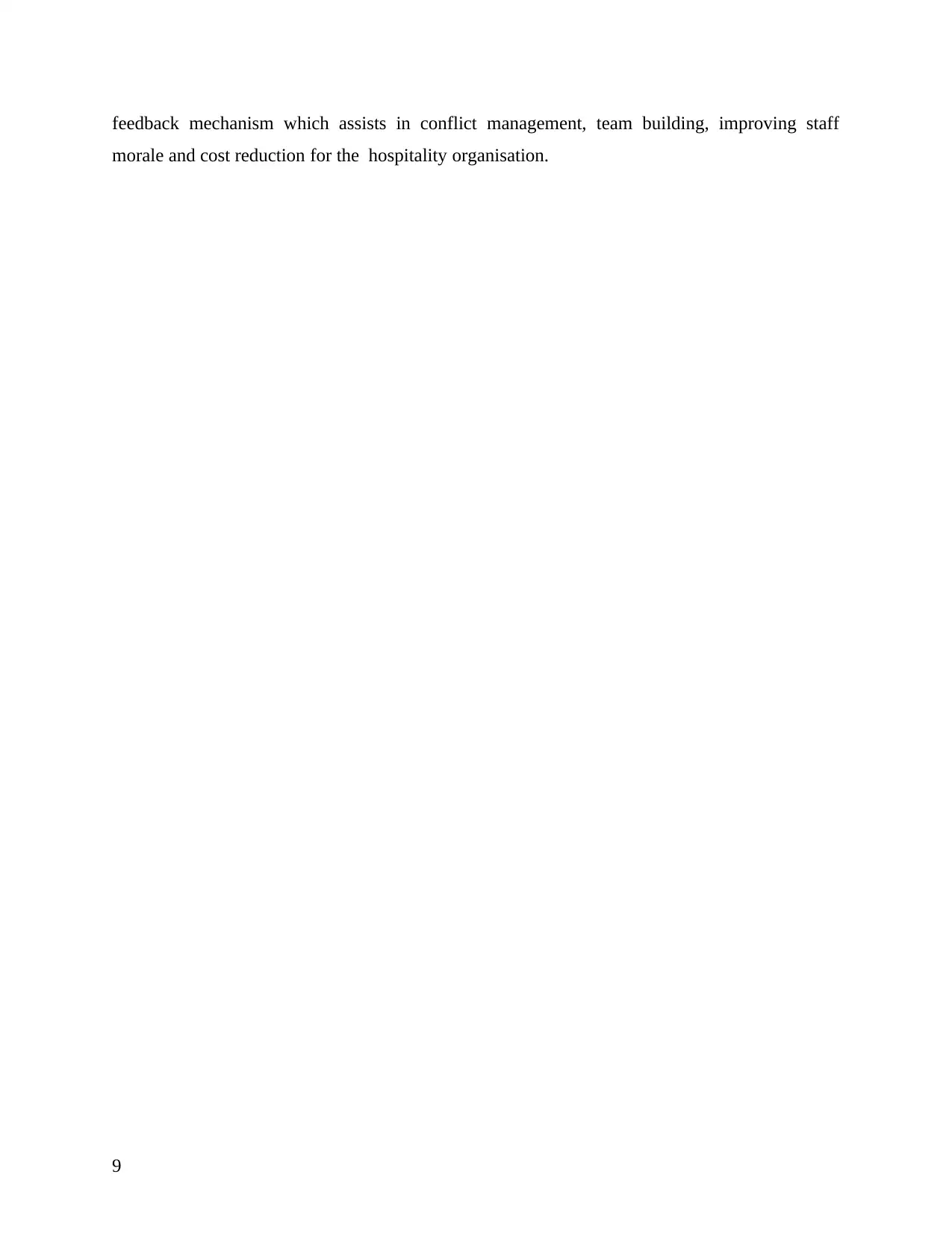
feedback mechanism which assists in conflict management, team building, improving staff
morale and cost reduction for the hospitality organisation.
9
morale and cost reduction for the hospitality organisation.
9
⊘ This is a preview!⊘
Do you want full access?
Subscribe today to unlock all pages.

Trusted by 1+ million students worldwide
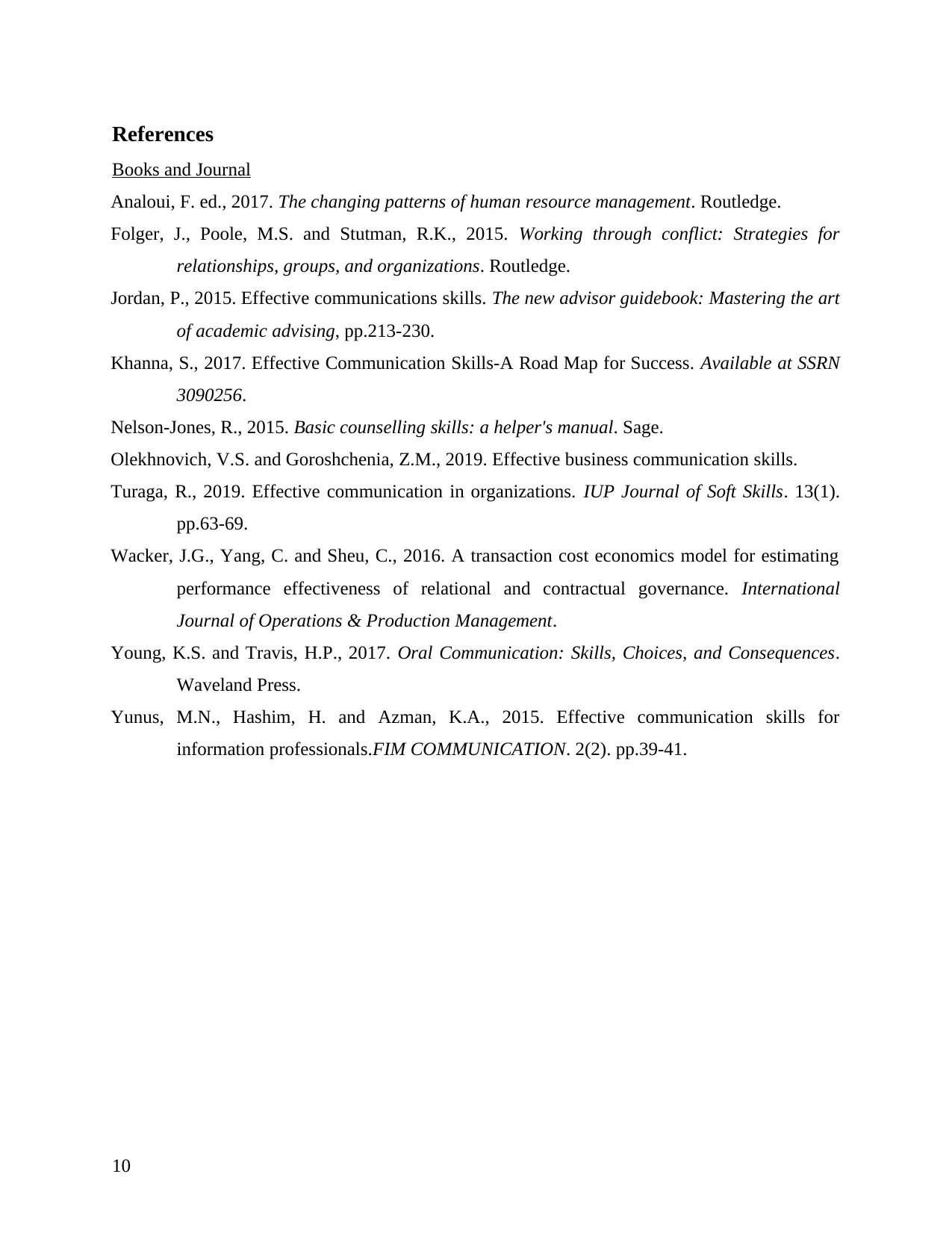
References
Books and Journal
Analoui, F. ed., 2017. The changing patterns of human resource management. Routledge.
Folger, J., Poole, M.S. and Stutman, R.K., 2015. Working through conflict: Strategies for
relationships, groups, and organizations. Routledge.
Jordan, P., 2015. Effective communications skills. The new advisor guidebook: Mastering the art
of academic advising, pp.213-230.
Khanna, S., 2017. Effective Communication Skills-A Road Map for Success. Available at SSRN
3090256.
Nelson-Jones, R., 2015. Basic counselling skills: a helper's manual. Sage.
Olekhnovich, V.S. and Goroshchenia, Z.M., 2019. Effective business communication skills.
Turaga, R., 2019. Effective communication in organizations. IUP Journal of Soft Skills. 13(1).
pp.63-69.
Wacker, J.G., Yang, C. and Sheu, C., 2016. A transaction cost economics model for estimating
performance effectiveness of relational and contractual governance. International
Journal of Operations & Production Management.
Young, K.S. and Travis, H.P., 2017. Oral Communication: Skills, Choices, and Consequences.
Waveland Press.
Yunus, M.N., Hashim, H. and Azman, K.A., 2015. Effective communication skills for
information professionals.FIM COMMUNICATION. 2(2). pp.39-41.
10
Books and Journal
Analoui, F. ed., 2017. The changing patterns of human resource management. Routledge.
Folger, J., Poole, M.S. and Stutman, R.K., 2015. Working through conflict: Strategies for
relationships, groups, and organizations. Routledge.
Jordan, P., 2015. Effective communications skills. The new advisor guidebook: Mastering the art
of academic advising, pp.213-230.
Khanna, S., 2017. Effective Communication Skills-A Road Map for Success. Available at SSRN
3090256.
Nelson-Jones, R., 2015. Basic counselling skills: a helper's manual. Sage.
Olekhnovich, V.S. and Goroshchenia, Z.M., 2019. Effective business communication skills.
Turaga, R., 2019. Effective communication in organizations. IUP Journal of Soft Skills. 13(1).
pp.63-69.
Wacker, J.G., Yang, C. and Sheu, C., 2016. A transaction cost economics model for estimating
performance effectiveness of relational and contractual governance. International
Journal of Operations & Production Management.
Young, K.S. and Travis, H.P., 2017. Oral Communication: Skills, Choices, and Consequences.
Waveland Press.
Yunus, M.N., Hashim, H. and Azman, K.A., 2015. Effective communication skills for
information professionals.FIM COMMUNICATION. 2(2). pp.39-41.
10
1 out of 10
Related Documents
Your All-in-One AI-Powered Toolkit for Academic Success.
+13062052269
info@desklib.com
Available 24*7 on WhatsApp / Email
![[object Object]](/_next/static/media/star-bottom.7253800d.svg)
Unlock your academic potential
Copyright © 2020–2026 A2Z Services. All Rights Reserved. Developed and managed by ZUCOL.



